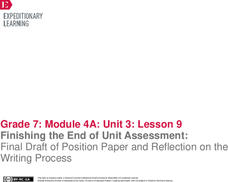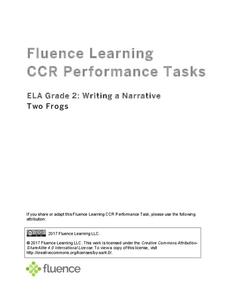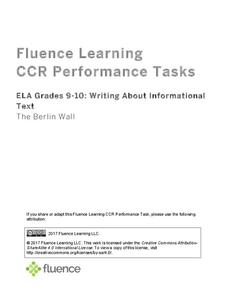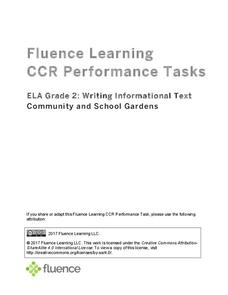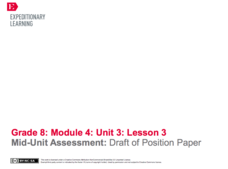EngageNY
End of Unit 2 Assessment: Final Draft of Literary Argument Essay
Take the last step in writing a literary argument essay using Bud, Not Buddy by Christopher Paul Curtis in an activity focused on feedback. Using the stars and steps revision method, pupils consider teacher and peer feedback to revise...
Fluence Learning
Writing About Informational Text: The Dred Scott Decision
Looking for a performance assessment that asks individuals to demonstrate their competency in writing about informational text? Use Frederick Douglass' essay "On the Dred Scott Decision," and an excerpt from Abraham Lincoln's 1857 speech...
EngageNY
Finishing the End of Unit Assessment: Final Draft of Position Paper and Reflection on the Writing Process
Think about it. Writers think about their end of unit essays through reflection. They use the End of Unit 3 Assessment, Part 2: Reflection on the Writing Process handout to analyze the writing process they used to create their...
EngageNY
Peer Critique and Pronoun Mini-Lesson: Revising Draft Literary Analysis
See what peers really think. Scholars give a peer critique of the their essay drafts from the previous lesson. They then participate in a mini lesson about pronouns. Pupils write examples of each type of pronoun on sticky notes and put...
K20 LEARN
Seeing the Big Picture - Incorporating Thesis, Evidence, Elaboration, and Concluding Statements in Your Essay: Elements of an Essay
Writers examine the elements of an informational essay, identify them in several essay snapshots, and then craft their own to demonstrate what they have learned.
EngageNY
End of Unit 2 Assessment, Part 1b: Writing Introduction and Conclusion
Writers continue looking at the rubric for their A Long Walk to Water essays. This time, they analyze the demands for the introduction and conclusion paragraphs. Pupils compare the rubric to the opening and closing of the model...
EngageNY
Writing an Argumentative Essay: Peer Critique
Writing is all about progress, not perfection. Scholars engage in a peer critique protocol to gain feedback on their quote sandwich from a previous lesson. Next, pupils begin drafting their argumentative essays based on the novel Lyddie...
EngageNY
Informational Essay Planning: Studying the Essay Prompt and Gathering Evidence
Using a Gathering Evidence note-catcher, readers record evidence in A Mighty Long Way and Little Rock Girl 1957. They then use the evidence to analyze and discuss different mediums with their peers. Lastly, they look at a writing prompt...
EngageNY
End of Unit Assessment: Final Position Paper
All good essays must come to an end. Pupils write the final drafts of their position papers about the best food chain from Michael Pollan's The Omnivore's Dilemma. Next, they share their favorite part of their papers with their partners.
Fluence Learning
Writing About Informational Text: Political Parties
To demonstrate their ability to craft an analysis of informational text, class members read excerpts from James Madison's "The Federalist No. 10," from George Washington's Farewell Address, and from Thomas Jefferson's First Inaugural...
Curated OER
Brainstorming for a Song Essay
Use this brainstorming organizer to help writers organize their song ideas. Starting with the name of the song, they will use bubbles to brainstorm various elements of a song from lyrics to meaning.
Fluence Learning
Writing an Argument: Free Speech
How do you assess whether pupils have mastered certain concepts and skills? Designing a performance task that asks learners to demonstrate their skills and providing writers with a rubric that identifies these skills and provides...
EngageNY
End of Unit Assessment, Part 1: Revising Claims and Evidence Based on Feedback
Revisit, revise. Scholars receive their position papers returned with feedback from the teacher. They use colored pens to identify feedback related to the first two rows of the rubric and correct their papers based on the comments....
Open Oregon Educational Resources
Oregon Writes Open Writing Text
Are some resource books more confusing than helpful? The creator of Oregon Writes Open Writing Text thinks so. That is why the text remains a living document with input from teachers, librarians, and scholars. The eBook begins with...
EngageNY
Revising Draft Letters to a Publisher about an Athlete’s Legacy: Critique and Feedback, Part I
Pick a corner, any corner! Pupils use the Four Corners strategy and Peer Critique protocol to assess one another's draft letters to a publisher about an athlete's legacy. Scholars then use peer feedback to revise their letters.
William E.B. DuBois Elementary
Persuasive Writing Graphic Organizer
Take your pick of 16 graphic organizers, all designed for persuasive writing. Some provide space to prepare an entire essay or speech, while others provide space for brainstorming and organizing ideas before settling on...
K12 Reader
Using Inference in Writing
What could have happened to a plane buried in snow? Have kids practice making inferences with a writing prompt for which they describe a photo without using specific key words.
Fluence Learning
Writing a Narrative: Two Frogs
Three options offer young writers the opportunity to read a short story, answer questions, and write a response. A handy language arts resource focuses on reading comprehension and analyziing the story's lesson: look before you leap.
Fluence Learning
Writing an Opinion: Student Council
A three-part assessment challenges scholars to write opinion essays covering the topic of the student council. After reading three passages, writers complete a chart, work with peers to complete a mini-research project, answer...
Class Antics
Leap Year: Write a Newspaper Article
Extra! Extra! Read all about leap year! Here, scholars write a newspaper article all about leap year/leap day from given facts including who, what, where, when, and why.
Fluence Learning
Writing About Informational Text The Berlin Wall
On June 26, 1963 President John F. Kennedy delivered his famous "Ich bin ein Berliner" speech close to the Berlin Wall at the Rudolph Wilde Platz. On June 12, 1987 President Ronald Reagan Delivered his famous "Mr. Gorbachev, tear down...
Fluence Learning
Writing Informational Text: Community and School Gardens
Two informational texts feature community gardens of the past and present and how seeds grow. Scholars read, discuss what they have read, complete a timeline, define words, and compose a brief essay about the texts' main idea.
EngageNY
Mid-Unit Assessment: Draft of Position Paper
What is the purpose of an introduction and conclusion? Using the resource, scholars review the model position paper from activity one and discuss the author's choices. Next, they draft their position papers' introductory and concluding...
Curated OER
Writing and Scholarship Planning For College-Bound Students: Brainstorming Time
Students examine the process of scholarship and college essay writing. They develop a list of key words and concepts, complete handouts, and complete an outline of an essay.
Other popular searches
- Descriptive Essay Writing
- Argumentative Essay Writing
- Five Paragraph Essay Writing
- 5 Paragraph Essay Writing
- Essay Writing Topics
- Essay Writing Lessons
- Concept Essay Writing
- 5 Essay Writing
- Essay Writing 5 Paragraphs
- Setting in Essay Writing
- Writing an Essay
- Essay Writing Process




